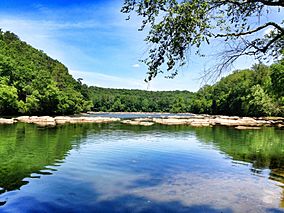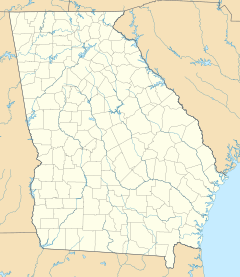Chattahoochee River National Recreation Area facts for kids
Quick facts for kids Chattahoochee River National Recreation Area |
|
|---|---|
|
IUCN Category V (Protected Landscape/Seascape)
|
|

View northwards up the river from Atlanta at East Palisades (April 2012)
|
|
| Location | Cobb, Forsyth, Fulton, & Gwinnett counties, Georgia, USA |
| Nearest city | Park headquarters: 1978 Island Ford Parkway, Sandy Springs, GA 30350 |
| Area | 10,550 acres (4,269 ha) 5,124 acres (2,074 ha) federal |
| Established | August 15, 1978 |
| Visitors | 3,161,297 (in 2011) |
| Governing body | National Park Service |
| Website | Chattahoochee River National Recreation Area |
The Chattahoochee River National Recreation Area (CRNRA) is a special place in Georgia, USA. It protects a 48-mile (77 km) stretch of the Chattahoochee River between Atlanta and Lake Sidney Lanier. This area offers many fun activities and chances to explore history. President Jimmy Carter created this national recreation area on August 15, 1978.
The park's main office and visitor center are located at the Island Ford Unit. You can find it at 1978 Island Ford Parkway in Sandy Springs, Georgia.
Contents
Exploring the Chattahoochee River
The Chattahoochee River is a great place for fishing. It is home to 23 different kinds of game fish. You can fish here all year long if you have a Georgia fishing license and a trout stamp.
In 2012, this area became the first river to be named a National Water Trail. This system helps people find places for water-based outdoor fun. It also encourages communities to care for their local waterways.
Popular Park Units
The park has many different sections, each with unique features.
Cochran Shoals
Cochran Shoals is the biggest and most visited part of the park. It has a 3-mile (5 km) fitness trail. This trail is perfect for walking, jogging, or biking. It is also wheelchair-accessible. Many people enjoy watching birds and other wildlife here.
Sope Creek and Akers Mill
The historic Marietta Paper Mill ruins are found in the Sope Creek unit. These old buildings are along Sope Creek. In the West Palisades unit, you can find the Akers Mill ruins. These are located along Rottenwood Creek.
East and West Palisades
The East Palisades unit has steep rock cliffs. These cliffs rise up from the river's flat flood plain. It's a very scenic area to visit.
Powers Island
Powers Island is named after James Power. He started a ferry service here in 1835. This ferry connected Sandy Springs to Cobb County. During the Civil War in 1864, General William Sherman's army used Power's Ferry. A bridge was built in 1903 to replace the ferry.
Vickery Creek Unit
The Vickery Creek unit protects a beautiful part of Vickery Creek. This creek is also known as Big Creek. Here, you can see the ruins of Ivy Mill. This was a wool mill that made fabric for soldiers during the Civil War. The Union Army destroyed Ivy Mill in 1864. The Allenbrook House, built in 1857, was the home of the mill manager.
From Vickery Creek, you can easily reach other nearby parks. These include Chattahoochee River Park and Riverside Park. You can also get to the Chattahoochee Nature Center. The Roswell Mill can be reached by a trail and a covered bridge. This bridge crosses the creek where the Roswell Mill Machine Shop once stood.
River Activities
The Chattahoochee River is one of Georgia's best trout streams. It's also a great spot for boating, canoeing, and rafting. In the summer, many visitors rent tubes and float down the river. A popular route is from Powers Island to Paces Mill.
Park Rangers
United States Park Rangers keep the park safe. They patrol the 48 miles (77 km) of river and 10,000 acres of land. They use patrol vehicles, boats, kayaks, and mountain bikes. They also hike the trails on foot.
Park Rangers are trained police officers. They can carry firearms and make arrests. They also have training in emergency medical services and fighting wildfires. They complete many months of special training to protect visitors and the park's natural beauty.
Awards and Recognition
In 2014, the CRNRA received an award for its great work in environmental education. This award came from the Georgia Environmental Education Association.
Images for kids
 | Lonnie Johnson |
 | Granville Woods |
 | Lewis Howard Latimer |
 | James West |






